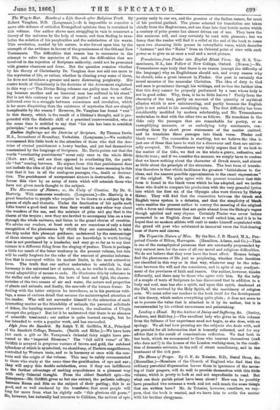Translations from Pinder into English Blank Verse. By H. S.
Tre- menheere, MA., late Fellow of New College, Oxford. (Moxon.)—Mr. Tremenheere says truly that there is no reason (except the difficulty of the language) why an Englishman should not, and every reason why he should, take a great interest in Pinder. Our poet is certainly the moral ancestor of the muscular Christian. The idea of duty to God and man is prominent through his writings, and no less the farther ides. that this duty cannot be properly performed by a man whose body i& not in good order. Why, then, is he ao little known ? Partly from the obscurity of the text, partly on account of the quantity of mythical allusion which is now uninteresting, and partly because the English lyric is not suited to his moralizing vein. The first difficulty has been. considerably modified by modern scholarship, and Mr. Tremenheere undertakes to deal with the other two as follows. He translates in the. Odes only the passages that are remarkable for poetry, or as- exemplifying manners, or as embodying lofty sentiments, con- . neeting them by short prose statements of the matter omitted, and he translates these passages into blank verse. Pinder and blank verse ! The connection is startling, but we believe the idea is just one of those that have to wait for a discoverer and then are univer- sally accepted. Mr. Tremenheere very fairly argues that if we look to- the matter of the Odes, we find on the whole a grave, reflective, and didactic tone ; and if we consider the manner, we simply have to confess that we know nothing about the character of Greek music, and almost as little about the principle of the structure. The best form of transla- tion therefore is that which facilitates the greatest "faithfulness to the ideas, and the nearest possible approximation to the exact expressions" of the original. We quite agree with the present translator that this- form is found in the blank verse which he has adopted, and we invite those who doubt to compare his production with the very graceful lyrics. into which the first six of the Olympic odes were thrown by Bishop Heber. They will find that the connection between the Greek and. English verse system is s delusion, and that the simplicity of blank verse enables the present author to convey the meaning of the original with a force and clearness that are quite absent from the Bishop's vague though spirited and easy rhyme. Certainly Pinder was never before presented in an English dress that so well suited him, and it is to be hoped that no modern athlete will omit to make himself acquainted with the grand old poet who celebrated in immortal verse the God-fearing man of thews and sinews.






























 Previous page
Previous page